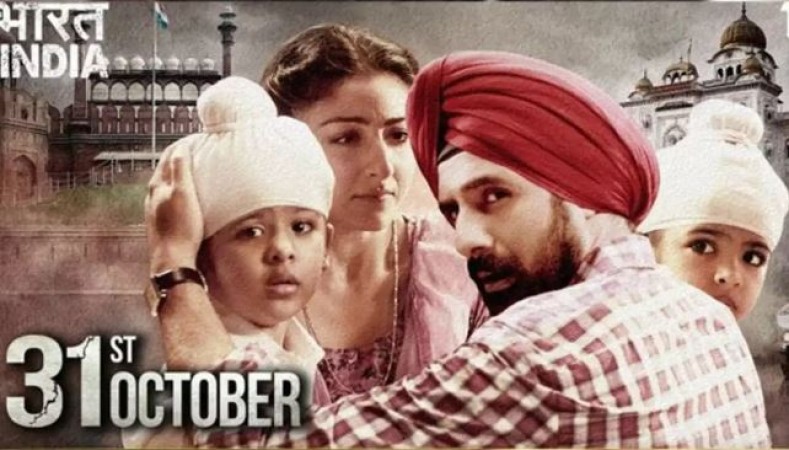
It is common practise in the film industry for filmmakers to use a variety of methods and tactics to produce engrossing and believable scenes. One such intriguing occurrence was in the movie "31st October," where the twins who were supposed to be waiting at the bus stop for the school bus were actually two girls, as opposed to the two girls who were supposed to be waiting at the bus stop being two boys. This unexpected identity change not only adds another level of complexity to the movie, but it also emphasises how cinema can change people. The complexity of the film, the gifted twin actors, and the larger implications of such artistic decisions will all be examined in greater detail in this article as we explore this unusual occurrence.
Let's first set the scene by briefly discussing the film "31st October" before delving into the fascinating revelation regarding the twin actors. The true events that took place in Delhi after Prime Minister Indira Gandhi's murder on October 31, 1984, are the basis for the historical drama film directed by Shivaji Lotan Patil that was released in 2016. The story revolves around the city's descent into anarchy, violence, and turmoil following the tragic incident.
The central conflict of "31st October" centres on a Sikh family residing in Delhi during the anti-Sikh riots that occurred after the assassination of Indira Gandhi. The father, who is portrayed by Vir Das, makes significant efforts to shield his family from the widespread violence and ensure their survival during those bleak times. The twins in question, who are important to the story, are the offspring of this Sikh family.
The subtle but significant twist involving the twin actors is what distinguishes "31st October" from other historical dramas. The audience later discovers that the two girls they initially thought were waiting for the school bus were actually boys. However, the real-life twins who played the brothers in the movie are twin girls, not the twin boys who played them. In addition to giving the characters more nuance, this unexpected development also raises concerns about how easily identities can change in the world of film.
This intriguing turn in "31st October" was brought about by the twin actors Saanvi and Anvita Sood. These young actors, who were born in 2004, have already made a name for themselves in the movie business. Saanvi and Anvita started acting at a young age, and their commitment to and love of the business are evident in their roles in "31st October."
The older of the twins, Saanvi Sood, played the role of the older sister in the movie. Saanvi, who was only 12 at the time the film was released, gave a remarkable performance, perfectly capturing her character's fear, perplexity, and resiliency during the tumultuous times portrayed in the movie. Her versatility as an actor is demonstrated by her ability to adjust to the unexpected twist of playing a boy on screen.
The younger twin, Anvita Sood, portrayed the younger sister in "31st October." Like her sister, Anvita gave a powerful performance that showed her emotional range and dedication to the role. Her emotionally charged and convincing portrayal of a boy in the movie gave her character's identity more nuance.
An intentional and thought-provoking choice was made by director Shivaji Lotan Patil to cast twin girls as the twin boys in the movie. He had the idea to put traditional gender roles and expectations to the test while highlighting the commonality of human feelings and experiences. In the movie, Patil intentionally blurred the lines between gender identities in an effort to illustrate how people of any gender can connect with and empathise with characters.
The gender-swapped casting in "31st October" is a potent reminder of how cinema can change people's lives. It challenges societal expectations and nudges viewers to reconsider stereotypes of gender roles and identities. Such artistic decisions contribute to a larger discussion about representation in the entertainment industry, which is a topic of increasing importance in a world where gender diversity and inclusivity are important discussion points.
Saanvi and Anvita Sood's performances also emphasise the value of talent and commitment over gender-specific casting. It supports the idea that actors should be chosen for their capacity to bring characters to life rather than for their ability to uphold established norms.
A layer of complexity is added to the already compelling movie "31st October" with the discovery that the twin actors were actually a pair of girls playing boys and vice versa. Constructive notions of gender identity and representation in film are questioned by Saanvi and Anvita Sood's outstanding performances and the director Shivaji Lotan Patil's vision. In addition to making the movie stand out, this original artistic decision also advances a larger discussion about the changing landscape of gender diversity and inclusivity in the entertainment business. The moving film "31st October" serves as a sobering reminder that anything is possible in the world of cinema and that storytelling can be a potent tool for challenging social norms and perceptions.
Bollywood's 'Aadat' Transformation: From Copyright Clash to Iconic Song
How 'Go Goa Gone' Redefined Indian Cinema
21 Years Later, Sanjay Dutt and Madhuri Dixit's Fiery Chemistry Ignites 'Kalank'